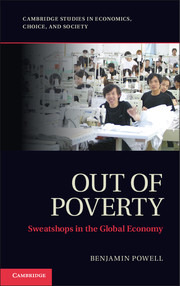Book contents
- Frontmatter
- Contents
- Figures
- Tables
- Acknowledgments
- Preface
- 1 Introduction
- 2 The Anti-Sweatshop Movement
- 3 The Economics of Sweatshop Wage Determination
- 4 Don’t Cry for Me, Kathie Lee
- 5 Health, Safety, and Working Conditions Laws
- 6 Save the Children?
- 7 Is It Ethical to Buy Sweatshop Products?
- 8 A History of Sweatshops, 1780–2010
- 9 The Process of Economic Development
- 10 What Good Can Activists Do?
- 11 Conclusion
- References
- About the Author
- Index
- References
5 - Health, Safety, and Working Conditions Laws
Published online by Cambridge University Press: 05 June 2014
- Frontmatter
- Contents
- Figures
- Tables
- Acknowledgments
- Preface
- 1 Introduction
- 2 The Anti-Sweatshop Movement
- 3 The Economics of Sweatshop Wage Determination
- 4 Don’t Cry for Me, Kathie Lee
- 5 Health, Safety, and Working Conditions Laws
- 6 Save the Children?
- 7 Is It Ethical to Buy Sweatshop Products?
- 8 A History of Sweatshops, 1780–2010
- 9 The Process of Economic Development
- 10 What Good Can Activists Do?
- 11 Conclusion
- References
- About the Author
- Index
- References
Summary
Sweatshop critics are often more upset about the conditions under which the workers toil than about the wages the workers are paid. Sometimes sweatshop critics even admit that the wages are better than alternative available employment, and make the working conditions their sole focus.
A November 2012 factory fire in Bangladesh sparked worldwide outrage over safety conditions. The Tarzeen factory, which made cloths for Wal-Mart and Disney, was denied a renewal of its fire safety certificate the previous June because of safety violations, but it continued operating without the certificate. Then tragedy struck, when a fire ripped through the eight-story building, killing 112 garment workers who were trapped inside. Subsequent investigations found that a quarter of the factories operating in the industrial zone where Tarzeen was located lacked fire safety certificates. The executive director of the Bangladesh Center for Worker Solidarity, Kalpona Aktar, spoke what many felt when she said, “These factories should be shut down.” But, as tragic as this fire was, is she right? Would workers be better off if factories that do not comply with safety standards are prohibited?
- Type
- Chapter
- Information
- Out of PovertySweatshops in the Global Economy, pp. 63 - 82Publisher: Cambridge University PressPrint publication year: 2014



